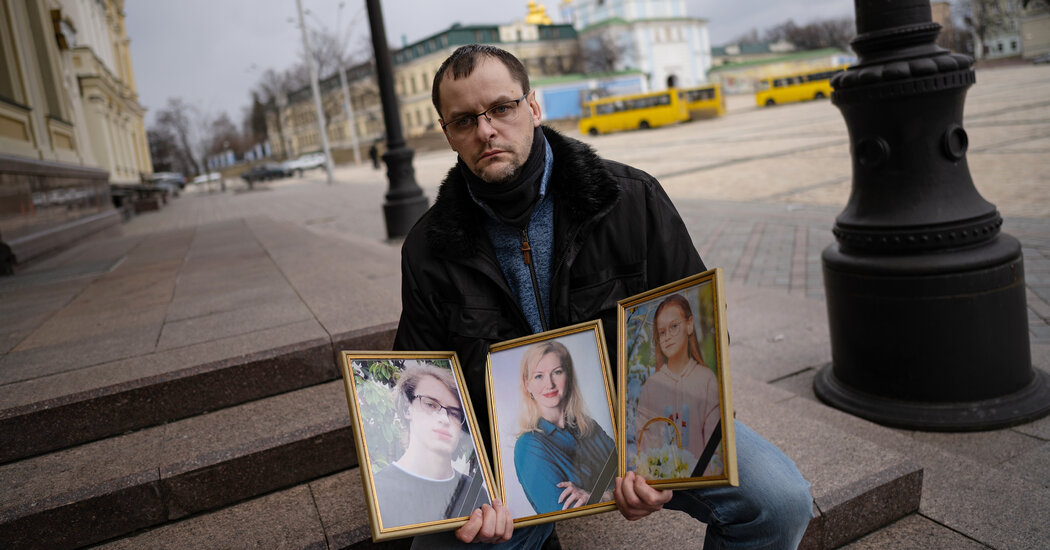KYIV, Ukraine — They met in high school but became a couple years later, after meeting again on a dance floor at a Ukrainian nightclub. Married in 2001, they lived in a bedroom community outside Kyiv, in an apartment with their two children and their dogs, Benz and Cake. She was an accountant and he was a computer programmer.
Serhiy and Tetiana Perebyinis owned a Chevrolet minivan. They shared a country home with friends, and Ms. Perebyinis was a dedicated gardener and an avid skier. She had just returned from a ski trip to Georgia.
And then, late last month, Russia invaded Ukraine, and the fighting quickly moved toward Kyiv, the capital. It wasn’t long before artillery shells were crashing into their neighborhood. One night, a shell hit their building, prompting Ms. Perebyinis and the children to move to the basement. Finally, with her husband away in eastern Ukraine tending to his ailing mother, Ms. Perebyinis decided it was time to take her children and run.
They didn’t make it. She and her two children, Mykyta, 18, and Alisa, 9, along with a church volunteer who was helping them, Anatoly Berezhnyi, 26, were killed on Sunday as they dashed across the concrete remnants of a damaged bridge in their town of Irpin, trying to evacuate to Kyiv.
Their luggage — a blue roller suitcase, a gray suitcase and some backpacks — was scattered near their bodies, along with a green carrying case for a small dog that was barking.
They were four people among the many who tried to cross that bridge last weekend but their deaths resonated far beyond their Ukrainian suburb. A photograph of the family and Mr. Berezhnyi lying bloodied and motionless, taken by the New York Times photographer Lynsey Addario, encapsulates the indiscriminate slaughter by an invading Russian army that has increasingly targeted heavily-populated civilian areas.
The family’s lives and their final hours were described in an interview Friday by Mr. Perebyinis and a godmother, Polina Nedava. Mr. Perebyinis said he learned of the death of his family on Twitter, from posts by Ukrainians.
Breaking down in tears for the only time in the interview, Mr. Perebyinis said he told his wife the night before she died that he was sorry he wasn’t with her.
“I told her, ‘Forgive me that I couldn’t defend you,’” he said. “I tried to care for one person, and it meant I cannot protect you.”
“She said, ‘Don’t worry, I will get out.’”
After she didn’t, he said he felt it was important that their deaths had been recorded in photographs and video. “The whole world should know what is happening here,” he said.
The Perebyinis family had already been displaced once by war, in 2014, when they were living in Donetsk in the east and Russia fomented a separatist uprising. They moved to Kyiv to escape the fighting and started rebuilding their lives. When Russian tanks rolled into Ukraine last month, they could hardly believe it was happening again, Mr. Perebyinis said.
Ms. Perebyinis’ employer, SE Ranking, a software company with offices in California and London, had encouraged employees to leave Ukraine immediately once the fighting started. It had even rented rooms for them in Poland, Mr. Perebyinis said. But his wife delayed her departure because of uncertainty over how to evacuate her mother, who has Alzheimer’s disease.
A colleague at work, Anastasia Avetysian, said that SE Ranking had provided emergency funds for employees to evacuate and that Ms. Perebyinis, as the chief accountant in Ukraine, had been busy in her final days disbursing them.
“We were all in touch with her,” Ms. Avetysian said in a telephone interview. “Even when she was hiding in the basement, she was optimistic and joking in our group chat that the company would now need to do a special operation to get them out, like ‘Saving Private Ryan.’”
But behind the jokes was a period of waiting and intense worrying, Mr. Perebyinis said. His son, Mykyta, started sleeping during the day and staying up all night, keeping a vigil over his mother and sister. When there were sounds of fighting, he woke them up and all three would move into a corridor, away from the windows. “My son was under a lot of stress,” Mr. Perebyinis said.
Russia-Ukraine War: Key Things to Know
Chernobyl nuclear facility. The International Atomic Energy Agency said that the defunct power plant had been disconnected from electricity, though there was no need for immediate alarm. A power loss could affect the facility’s ability to keep the water that cools radioactive material circulating and lead to safety issues.
Last Saturday, after two days in the basement, they made a first attempt at evacuating. But as they were packing up their minivan, a tank rolled by on the street outside. They decided to wait.
The next day they were up and moving by about 7 a.m. Tetiana Perebyinis had discussed the plan in minute detail with her husband. She and her two children and her mother and father, who lived nearby, would join a church group and try to evacuate toward Kyiv, and then get somewhere safe from there.
They drove as far as they could, but Ms. Perebyinis was eventually forced to abandoned the minivan. They set out on foot toward the damaged bridge over the Irpin River.
To escape, they were forced to cross a hundred yards or so of exposed street on one side of the bridge. As Russian forces fired into the area, many tried to seek cover behind a brick wall.
Mr. Berezhnyi, the church volunteer, had earlier evacuated his own family but he returned to help others and was with Ms. Perebyinis and her children when they began to dash toward the other side.
Maria Varenikova contributed reporting from Lviv, Ukraine.


























